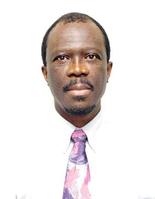
Martin Henry
Andrew Holness has been made to apologise for refusing to shake hands with the head of the Peace Management Initiative and Political Ombudsman, Bishop Herro Blair. The bishop is yet to apologise publicly for refusing to shake hands with Holness, who later offered his hand as a peace offering.
I am always wary of enforced apologies. And the leader of the JLP, Bruce Golding, having publicly stated that he would insist that the young Member of Parliament apologise, it is hard to determine whether the heretical Andrew has genuinely recanted or is simply complying with an order in order to save his political hide from a hiding.
Andrew mounted a powerful case for not endorsing the bishop's peace march in his constituency. He accused the PMI of hypocrisy and said it was supporting politicians of questionable character. Holness said several regulations set out in the Political Code of Conduct had been breached and that the double standard set by entities like the Bishop Blair-led PMI was leading him to contemplate resigning from active politics.
Done with gutter politics
In a week which began with the President of the PNP and Prime Minister, Portia Simpson Miller, telling the largest annual conference of the party ever, in the most belligerent manner, that she and the party were done with the old gutter tribal politics and calling on the JLP to stop provoking them and do the same, Andrew Holness, refusing to walk with the bishop, laid some pretty serious charges against his opponent, Patrick Roberts. The head of the PMI too had his grouses. On the "mother of all walks", it was "offensive and destructive to the peace process", he complained, to have the Member of Parliament participating in a placard-bearing protest against the march and against the bishop.
Bishop Blair and the PMI have walked and talked but have never brought lasting peace anywhere. And cannot. The Sunday Gleaner this week mapped eight areas on a watch list for violence, leaving many more out in Kingston, not to mention Montego Bay and rural towns. Several of these areas have been walked and worked by the PMI before.
In the hot, running debates about St. Andrew and the Bishop, hardly anyone has asked the tough question about the legal and moral legitimacy of the PMI and the role of a Christian bishop as its head.
War
Peace follows war. And only those who can make war can make peace. Does the Jamaican state [and Church] seriously want to legitimise criminal killings, rapes and arson as 'war' - and the dirty politics behind much of the 'war'? When Bishop and his team sit with warriors/murderers/political acti-vists turned 'peacemakers', with their guns hidden away for later, are they not suspending the rule of law and the enforcement of law for very flimsy 'peace'? And with what long-term consequences? And when the police abandon pledged enforcement to collaborate, are they not flatly in treason?
Is justice for the victims, which should be urged by the Church and delivered by the state, to be sacrificed for 'peace' without penalty? Are criminals to walk free, as the law turns a blind eye, because they have shaken a bishop's hand?
The bishop's book cries out, "Justice is turned back. Truth is fallen in the street" (Isaiah 59: 14). And without justice "blood defiles the land" (Numbers 35:33).
Martin Henry is a communication specialist.

